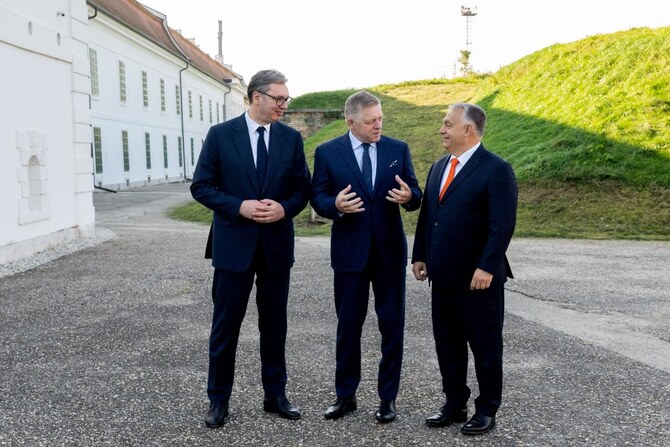
Hungary, Slovakia, and Serbia want money to fight people coming in illegally
On Tuesday, the presidents of Hungary, Slovakia, and Serbia reaffirmed their efforts to stop illegal immigration into the EU, saying that the best defense was to safeguard the bloc’s external borders and that further EU funding was required.
In the first nine months of 2024, there were just under 17,000 unlawful crossings via the western Balkans, a 79% decrease from the previous year, according to figures from the border agency Frontex.
During their meeting in Komarno, Slovakia, near the border with Hungary, the leaders commended their efforts to reduce the number of migrants, primarily from the Middle East and Africa, who have entered the EU through Hungary via the “Balkan route” through Serbia.
Usually, migrants go to western European nations with higher incomes, such as Germany.
Almost ten years after the 2015 crisis, when almost a million migrants entered the bloc, illegal migration is still a political issue throughout Europe. About one-third of that amount was arrived at last year.
The problem has forced governments to enact stricter policies and contributed to the growth of far-right groups. Last week, EU leaders decided to develop a stricter strategy to expedite the repatriation of unlawfully entered migrants.
Slovak Prime Minister Robert Fico and Hungarian Prime Minister Viktor Orban have long been among the most vocal opponents of EU migration policy, rejecting concepts like quotas for allocating migrants within the union.
Fico declared the battle against illegal migration a priority, saying, “We were right when we said very clearly at the beginning of the migration crisis that the basis of the fight against illegal migration is the protection of external EU borders.”
He said that because illegal migration posed a severe concern, they had spoken of allocating a sizeable portion of the EU budget beyond 2027 to combat it.
This year, there have been 80% fewer migrants in Serbia, according to President Aleksandar Vucic.
Hungary’s southern border is now closely guarded, and Orban has been at odds with Brussels on immigration policy since 2015. He said that the only effective model was the one that was applied in Hungary, which requires that asylum petitions be evaluated before a person is permitted entry into the EU.
According to him, hotspots established in the final safe havens for migrants, like Africa, may be a widespread remedy.
In an effort to discourage boat crossings, Italy last week started collaborating with EU non-member Albania by transferring refugees there to have their asylum application handled. Other EU leaders have stated that this approach may serve as a model.
Serbia, which is not a member of the EU, would never consent to establish illegal migrant hubs on its soil, according to Vucic.
All Categories
Recent Posts
Tags
+13162306000
zoneyetu@yahoo.com



